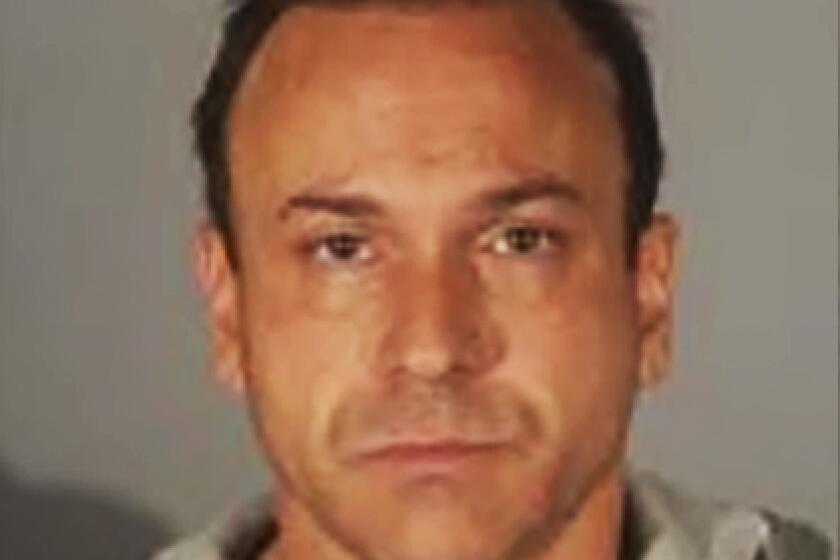Skepticism Greets Meeting Between Blacks, Koreans
Widespread skepticism surfaced Tuesday over the announced rapprochement between black gang members and Korean-American merchants, with a spokesman for the business owners saying that proposals to create jobs and secure financing to help rebuild South Los Angeles are still preliminary.
Jeong Seo, whose grocery store and liquor market on South Arlington Avenue was destroyed in the riots, said he was “surprised” when he read about the proposed joint ventures in the newspaper.
“Our Korean community lost around $400 million due to these riots without any apology from the African-American community leaders,” he said. “Now the gang members leading these riots are asking for kind of protection money for the promise to protect the businessmen. . . which is shocking to me.”
Meanwhile, new information emerged about the criminal past, a 1988 fraud conviction, of James H. Stern, the self-styled minister and black community leader who first broached the talks.
The unusual “summit” Monday between a handful of gang members and Korean-American merchants had been hailed by some community leaders as the first step of an effort to bridge a chasm of racial distrust and hostility that was in part blamed for the targeted looting and arson of Korean-American-owned businesses during the riots.
But David Kim, president of the 3,600-member California chapter of the Korean-American Grocers Assn., said Tuesday that the meeting produced “no signed agreement.
“We’re very interested in what they are offering,” Kim said. “But we have to take their suggestions to the Korean community (in meetings later this week). We have not concluded anything yet.”
The proposals include placing a branch of a Korean-American-owned bank in South Los Angeles to provide loans to African-Americans, providing good-paying jobs in Korean-American businesses to four members of each of the area’s two rival street gangs, and creating a joint venture, possibly a grocery store.
The proposals were advanced by Stern, who served two years in state prison after pleading guilty in 1988 to charges that he conspired to file phony student loan applications through vocational schools to bilk banks and the state of about $125,000.
In this current venture, he has called for the creation of a vocational school in South Los Angeles to provide job training programs to be run by African-Americans and Korean-Americans.
In an interview Tuesday, Stern denied that he would use the proposed school for financial gain. “I’m not going to even be involved in it. . . . I’m just trying to get a school down here,” he said.
Stern said the convictions were the result of youth. “I was guilty as all outdoors. . . . I was 19 years old, and it was stupid. I told the judge I was wrong then, and I served my time, and that’s it.”
Kim said his group had no knowledge of Stern’s background, but added that it would not necessarily detract from the Korean-American community’s consideration of his proposals.
Even so, some criticized the reported talks on Tuesday, cautioning that merchants not make too many concessions in an effort to make peace.
Ivan Light, a professor of sociology at UCLA and author of a 1988 book on Korean-American entrepreneurs, also likened the proposals to a thinly veiled protection racket.
“I don’t know to what degree the fires were set by gang members, but if you suppose they were . . . I’m reminded of how Al Capone organized the dry cleaners in Chicago in the 1920s,” he said.
At Tuesday’s meeting of the Los Angeles County Board of Supervisors, Supervisor Mike Antonovich also criticized the Monday announcement, likening the proposed pact to “making a covenant with the Mafia.”
Kim vehemently denied that the talks represented any kind of “extortion,” adding that his group was not speaking only with gang members, but with anyone who could speak for the community.
“We’re willing to work within the traditional group-lines of the political system, but sometimes you have to take an alternative course to get results,” he said.
Others wondered whether it was realistic to expect much financial assistance from the hard-hit Korean-American community, which lost hundreds of businesses--many of them uninsured--in the rioting that followed the not guilty verdicts in the Rodney G. King police beating trial.
“Many are small mom-and-pop stores, and I understand they are just struggling to pay their loans,” said an observer who works for the Korean-language press and whose spouse once owned an inner-city grocery. “I wonder if they can afford to extend such a generous program.”
Indeed, an earlier plan proposal by the grocers to provide jobs for 100 African-Americans, beginning this month, was put on hold because most of the participating grocery stores were burned down in the rioting.
Kim acknowledged fielding many calls Tuesday from Korean-Americans concerned about the talks. “Many misunderstand these meetings,” he said.
At a center set up to help displaced Korean-American business owners, a woman who owned a liquor and grocery store in Compton that was burned during the riots, said she would not be willing to employ gang members. “I can’t do that,” said the woman, who did not want her name used.
In the four years she owned her store, she had hired four African-Americans, but only one remains on the job. “When we give them jobs, they don’t work,” she said. “They want it easy.”
A spokesman for the 1992 Korean-American Victims Assn., representing store owners who lost businesses during the riots, said the group had no official response to the proposals that came out of Monday’s “summit.”
At the group’s Westlake Avenue office, a volunteer working with business owners said of the meeting: “It’s a political game.” He also spoke on the condition of anonymity because “this is a sensitive issue.”
Gang members also expressed skepticism.
At a neighborhood cleanup coordinated by Community Youth Gang Services, young men and women who described themselves as former and inactive gang members said they knew nothing of the talks between Stern and the Korean-American grocers.
As Alton Towers, 26, picked up debris on Compton Avenue in South Los Angeles, he said he considered the meeting “for promotional purposes only.”
Benjamin B. Hong, president and chief executive officer of Hanmi Bank, the largest Korean-American-owned bank in Los Angeles, said he had not been approached about opening a branch in South Los Angeles. But he added he would be willing to discuss the idea.
“We do feel responsible, that we should . . . further our banking services to the black community,” he said. “The point is, how we go about it.”
Hong added that he thought the talks were a “good idea.”
“The grocers association are the ones very much involved in the South-Central area. . . they are doing the right thing, spearheading the movement and the talk.”
Times staff writer Hector Tobar contributed to this story.
RELATED STORIES: B1, B3
More to Read
Sign up for Essential California
The most important California stories and recommendations in your inbox every morning.
You may occasionally receive promotional content from the Los Angeles Times.










